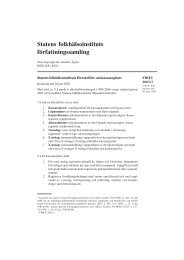Gambling motivation and involvement: A review of social
Gambling motivation and involvement: A review of social
Gambling motivation and involvement: A review of social
Create successful ePaper yourself
Turn your PDF publications into a flip-book with our unique Google optimized e-Paper software.
Concluding discussion<br />
<strong>Gambling</strong> – a multidimensional phenomenon<br />
The research <strong>review</strong>ed shows that gambling is a multidimensional phenomenon,<br />
which can be studied from many perspectives. This is even more evident if we keep<br />
in mind that the <strong>review</strong> excludes quite a few types <strong>of</strong> studies in the <strong>social</strong>, cultural<br />
<strong>and</strong> economical sciences, as well as the most extensive body <strong>of</strong> research in gambling:<br />
the psychological studies. The dimensions <strong>of</strong> gambling span from the neurological<br />
impulse in the brain <strong>of</strong> a gambler to push a button on a slot machine, to cities built<br />
on gambling <strong>and</strong> the regulatory frameworks that govern the business <strong>of</strong> gaming.<br />
Some gamblers push the button on the slot machine way too many times <strong>and</strong> it is<br />
this type <strong>of</strong> destructive behavior that has occasioned this <strong>review</strong>: the public health<br />
issue <strong>of</strong> problem gambling. In our time, excessive gambling is conceived mainly as<br />
a health problem – a risky overconsumption, an addiction or pathological compulsion<br />
– rather than a sin, a vice, or stupidity for which the individual has only<br />
himself to blame. Just as excessive gambling in earlier times had its cures – religious<br />
penance, moral correction, <strong>and</strong> listening to reason – today there are public<br />
health approaches, hopefully more effective than earlier efforts, regarding how to<br />
prevent people from ruining their lives by playing too much <strong>and</strong> how to help those<br />
already suffering from the negative consequences <strong>of</strong> excessive gambling. In order to<br />
implement these measures <strong>of</strong> prevention, intervention <strong>and</strong> treatment, knowledge is<br />
needed.<br />
The knowledge needed is essentially <strong>of</strong> two kinds. The first kind <strong>of</strong> knowledge is<br />
beyond the scope <strong>of</strong> this <strong>review</strong>: why do some individuals, <strong>and</strong> not others, start to<br />
play excessively, given similar <strong>social</strong> <strong>and</strong> cultural contexts? This question is commonly<br />
answered by psychologists who study how individual minds differ due to<br />
genetic <strong>and</strong> biological constitution, as well as particular histories <strong>of</strong> emotional experiences,<br />
<strong>social</strong> learning, <strong>and</strong> behavioral reinforcement.<br />
The second kind <strong>of</strong> knowledge needed deals with the collective level, rather than<br />
the individual level. This knowledge concerns two issues: firstly, what motivates<br />
people to gamble; <strong>and</strong> secondly, the reasons why certain categories <strong>of</strong> people are<br />
unusually highly involved in gambling, some having problems keeping their gambling<br />
within reasonable limits.<br />
64 G A M B L I N G M O T I VAT I O N A N D I N V O LV E M E N T

















